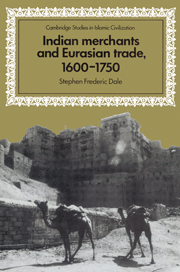Book contents
- Frontmatter
- Contents
- List of illustrations
- Preface
- Note on transliteration
- Abbreviations
- 1 An Indian world economy
- 2 India, Iran and Turan in 1600
- 3 The Indian diaspora in Iran and Turan
- 4 Indo-Russian commerce in the early modern era
- 5 The Indian diaspora in the Volga basin
- 6 Imperial collapse, mercantilism and the Mughul diaspora
- Appendix
- Bibliography
- Index
3 - The Indian diaspora in Iran and Turan
Published online by Cambridge University Press: 22 September 2009
- Frontmatter
- Contents
- List of illustrations
- Preface
- Note on transliteration
- Abbreviations
- 1 An Indian world economy
- 2 India, Iran and Turan in 1600
- 3 The Indian diaspora in Iran and Turan
- 4 Indo-Russian commerce in the early modern era
- 5 The Indian diaspora in the Volga basin
- 6 Imperial collapse, mercantilism and the Mughul diaspora
- Appendix
- Bibliography
- Index
Summary
When spring-time flushes the desert grass,
Our kafilas wind through the Khyber Pass.
Lean are the camels but fat the frails,
Light are the purses but heavy the bales.
As the snowbound trade of the North comes down
To the market-square of Peshawur town.
Rudyard Kipling: “The Ballad of the King's Jest”Panjabi Khattris, Pushtuns or Afghans and Marwaris were the principal merchant groups from Mughul territories who conducted business in Iran or Turan in the seventeenth and eighteenth century. Given the size, complexity and sophistication of the Indian economy they or other merchants from India's western and northwestern provinces are likely to have visited or resided in marketing centers of these contiguous regions for centuries or even millennia prior to Akbar's reign. Inclusion of the Kabul region in many powerful Indian states from as early as the reign of the Mauryas of Magadha (324–183 BC) to the Hindu Shahi dynasty of the ninth and tenth centuries AD make such commercial migration even more likely. Cities such as Balkh probably functioned as commercial outworks of these north Indian states, as is suggested by the report of the Arab geographer al-Maqdisi, who wrote in the twilight of Hindu Shahi rule that one of the city's gates was known as the bab-i Hinduwan, the gate of the Indians. In records of the sixteenth to eighteenth centuries the largely allusive references to Indian mercantile activity outside of South Asia which are the commonplace of earlier sources give way to eyewitness accounts and documentary evidence.
- Type
- Chapter
- Information
- Indian Merchants and Eurasian Trade, 1600–1750 , pp. 45 - 77Publisher: Cambridge University PressPrint publication year: 1994
- 1
- Cited by



